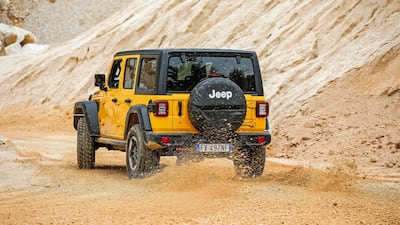Jeep is embarking on an aggressive electrification strategy that will see its entire fleet powered by either Plug-In Hybrid Electric (PHEV) or full electric (PEV) powertrains by 2022.
That's the word from the company's global president, Christian Meunier, after speaking to The National during a break from the global launch of its new Gladiator pick-up in wilds of New Zealand last week.
“With 80 years of history, our aim now is to make Jeep the greenest, most sustainable SUV brand in the world,” Meunier said.
“Starting in 2020 we will electrify the Renegade, Compass and Wrangler models as PHEVs and then move to fully electric vehicles soon after, so that by 2022 all Jeep models will be electrified.”
Formerly of Hong Kong-based luxury brand Infiniti, the recently installed Jeep boss understands the Chinese market better than most and in his first six months in the seat, he has made numerous visits to China to study ways in which the brand can tap into the lucrative and electric-dominated market.

“I have been living out of a suitcase for the past six months, travelling to China and other places, probably five or six times in that period as I’ve been getting up to speed with Jeep and how we are perceived globally,” he explained.
“We have not done so well in China over the last few months for various reasons, but we have brought in new management and have an aggressive product plan which will work well there because we cannot afford to be away from the number one market in the world.”
Jeep sold 300,000 vehicles in 2009 and, by the end of this year, should have exceeded five times that volume with an expected sales figure exceeding one-and-a-half million SUVs for the calendar year.
“But it’s not just China, we need to expand further into Europe, which has become an important hub for us to bring in an American brand and combine it with electrification.”
The push for electrification fits in with the Middle East’s agenda to pursue the zero-emission fuel option with a post-2020 plan for the UAE and a 2030 plan in Saudi Arabia for the mass roll-out of charging stations and incentives to promote the sales of electric vehicles.
The prospect of needing a recharge in the desert and away from the grid is an obvious concern for EV motorists and Meunier will be visiting the UAE to address this as part of an agenda that will include final desert testing for the new Gladiator pick-up scheduled to be launched in the region from early next year.
“For sure that is an issue, which is why we will start with PHEV, which I think will be very strong for us as it offers a lot of features like a 450-kilometre petrol range plus zero emission running in full electric mode for 50km that will eliminate any anxiety.
“Renegade and Compass will be the first to market as PHEV and we will announce a fully electric model shortly after.”
Questions, such as the added weight EVs have to carry for the batteries and how to satisfy the mechanics who need to fix cars on the go when things break in remote areas, are topics Jeep and other SUV manufacturers are still debating.
When asked if this could signal the end of traditional, big, cubic capacity V8 that Jeep drivers love to modify direct from the factory, courtesy of the company’s personalisation division, Meunier was coy with his answer, avoiding giving a definite “yes” or “no”.
“A Wrangler or Rubicon PHEV or even a full electric version is a car that is going to get from zero to 100 kilometres per hour in six seconds, which is a level of acceleration you will not get from a regular combustion engine in something like a Wrangler.
“All the V8s in the world won’t match an electric motor for acceleration, but where it’s really exciting is that you will get the endless torque that only electrification provides, and which will make off-roading that much easier. When you combine this with the superior on-road performance as well, I think it’s very exciting.”
Additionally, having an SUV powered by banks of high-voltage batteries should be a boon for the weekend camper, as it will allow a near-endless supply of power to operate air-compressors, camp lighting, hot water heaters and other ancillaries for a weekend living off the grid.
“We are also thinking about those things and how electrification can benefit the camper. There are so many opportunities for going electric,” he added.

